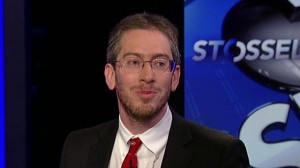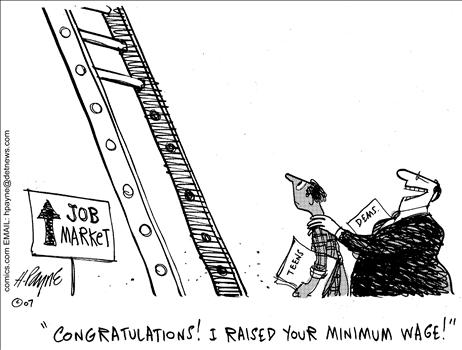 I’ve been a huge fan of Bryan Caplan since “The Myth of the Rational Voter” fundamentally changed the way I think about politics, voting, and democracies. I still haven’t read “Selfish Reasons to Have More Kids”, but I can’t wait to get started. In the meantime, however, here is an excellent article from Caplan about the conflict between theory and empiricial research when it comes to minimum wage laws. The article is great, but also a bit loaded with econ-jargon, so I’ll try to summarize.
I’ve been a huge fan of Bryan Caplan since “The Myth of the Rational Voter” fundamentally changed the way I think about politics, voting, and democracies. I still haven’t read “Selfish Reasons to Have More Kids”, but I can’t wait to get started. In the meantime, however, here is an excellent article from Caplan about the conflict between theory and empiricial research when it comes to minimum wage laws. The article is great, but also a bit loaded with econ-jargon, so I’ll try to summarize.
Economic theory says that when you increase the cost of something people buy less of it. This is pretty fundamental. (Bryan Caplan calls it “a strong prior”, meaning an initial belief that is solidly held.) If that’s true, then when you implement a minimum wage (raising the price of hiring people), companies will buy less of it (hire fewer workers). Theroetically, this is open-shut: minimum wage laws take jobs away from people who would otherwise have them. It’s like a wealth-transfer from the very-poorest to the almost-as-poor.
Empirical evidence, however, has not found a strong relationship between minimum wage laws and unemployment. So there’s a conflict. Bryan’s piece argues that we should go with the theory instead of the evidence… sort of.
First, he points out the social science evidence is not up to the standard of, say, physics. There are no repeatable experiments, data is missing or hard to measure, and the relationship between cause and effect is often impossible to identify because we’re not talking about gas particles interacting, we’re talking about people interacting. This means everyone has a plan, everyone is guessing what everyone else is doing, and so people don’t necessarily react the way you’d think they would.
Second, and probably more persuasively for people who haven’t studied econometrics, he argues that a lot of evidence does support the idea that minimum wages lower employment. You just have to look at related fields. Caplan considers 4:
- Research on the impact of low-skilled immigration shows that lots of new workers (big increase in supply) leads to a small change in wages (small decrease in price). This relationship is called “highly elastic”, and it implies that if the government mandates small changes in price (minimum wage laws) there will be large changes in the supply (the number of people who get jobs).
- Research on European labor laws shows that lots of costly laws designed to protect workers create very high unemployment numbers. Increasing minimum wage is just one variety of the kinds of government regulation that increase labor costs, so its reasonable to have the same impact.
- Research on other kinds of price control (e.g. rent control) show the same kind of effect: if the government enforces price floors or price ceilings you can expect strong effects in the marketplace.
- Keynesian economists believe that one cause of unemployment is price-rigidity in wages. If a company needs to save money, it will usually lay of 10% of the company rather than give the entire company a 10% pay cut. This is an example of price-rigidity in wages: they just don’t go down very often. As a result, if the value of a workers input falls, usually their wages won’t fall. They will just lose their job. This is part of how Keynesian economics explains unemployment during recessions. But the same basic function is at play when minimum wages are hiked: the value of the workers input relative to their output falls. So, by their own logic, shouldn’t unemployment rise?
I also really like the conclusions Caplan draws from all of this:
From the standpoint of public policy, the minimum wage is a symbol of the view that “feel-good” policies are viable solutions to social ills: “Workers aren’t paid enough? Pass a law so employers have to pay them more. Problem solved.” From the standpoint of social science, the minimum wage is a symbol of the myopic view that you can become an expert on X by reading nothing but the leading research that explicitly addresses X: “Does the minimum wage reduce employment? Read the top papers on the minimum wage. Problem solved.”

EconLog is one of the economic websites I consistently read, mainly for Caplan’s posts. The other is his GMU colleague Don Boudreaux’s “Cafe Hayek” (http://cafehayek.com/). Big influences on my economic thinking.
You and I area too much alike. It’s scary.